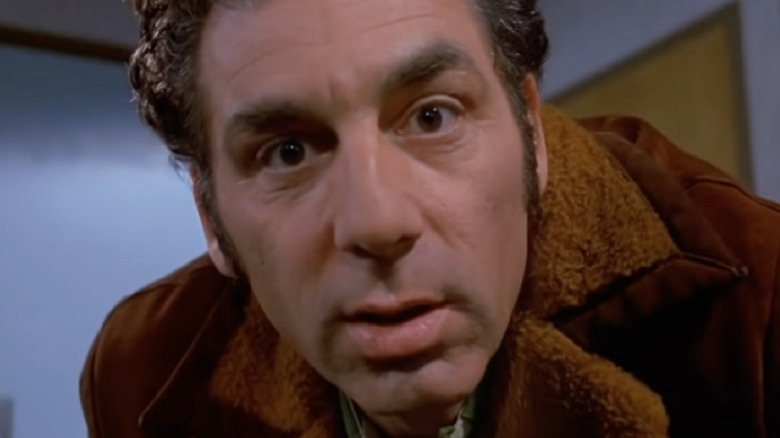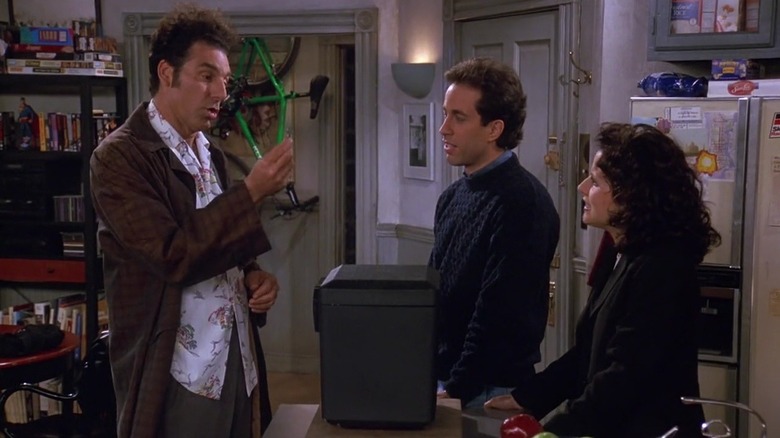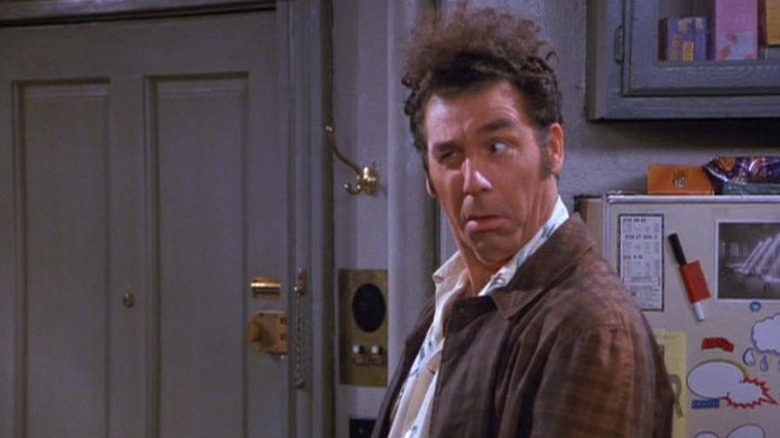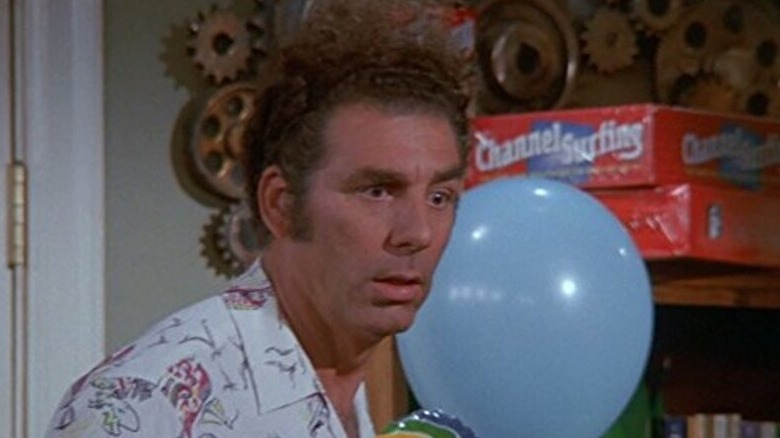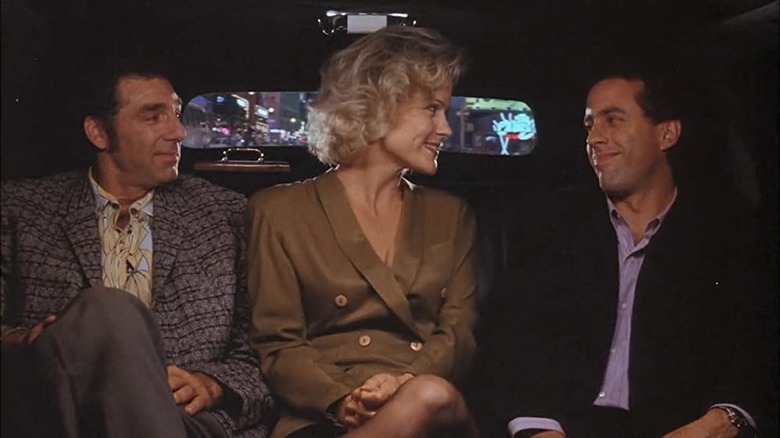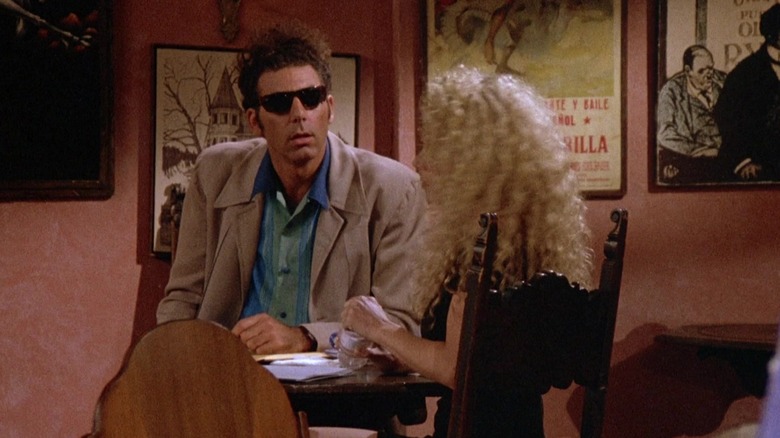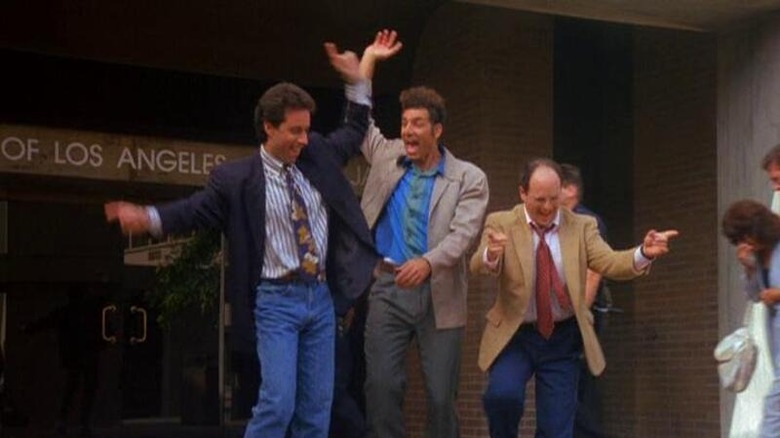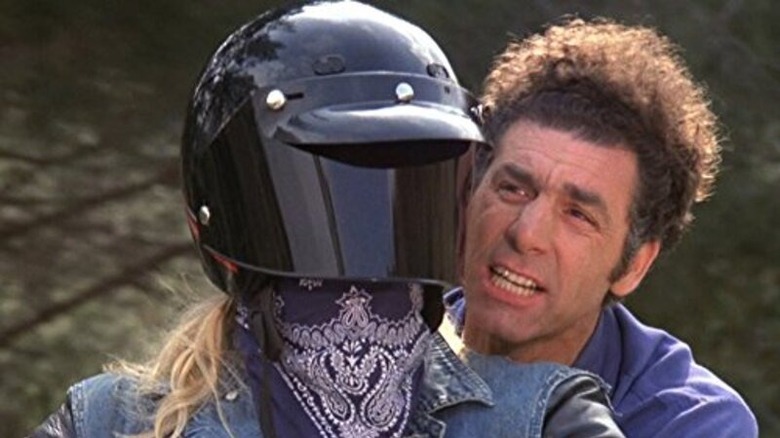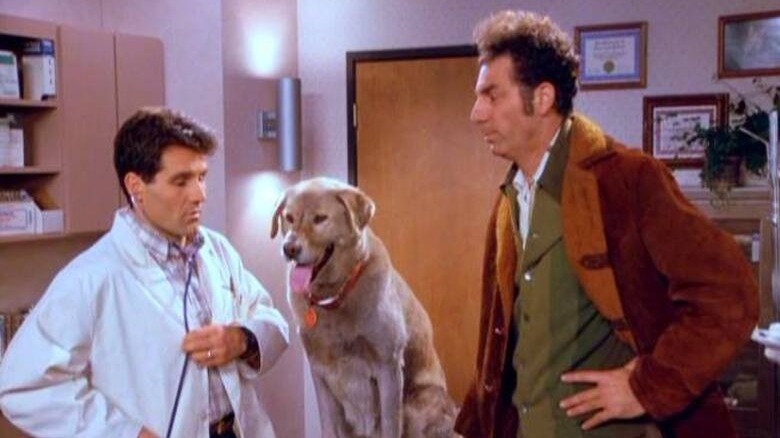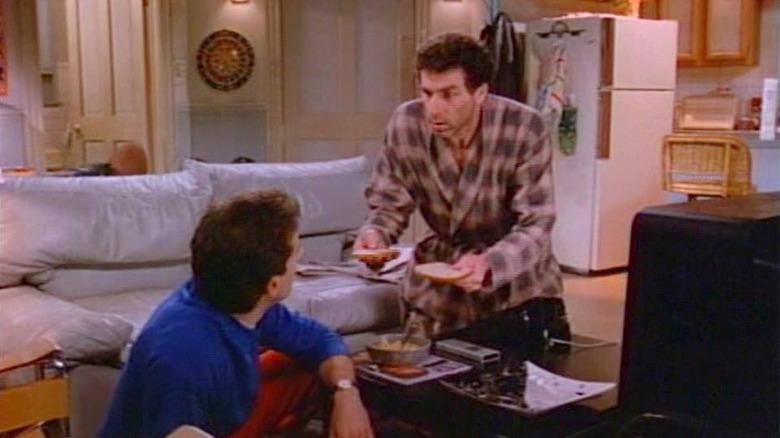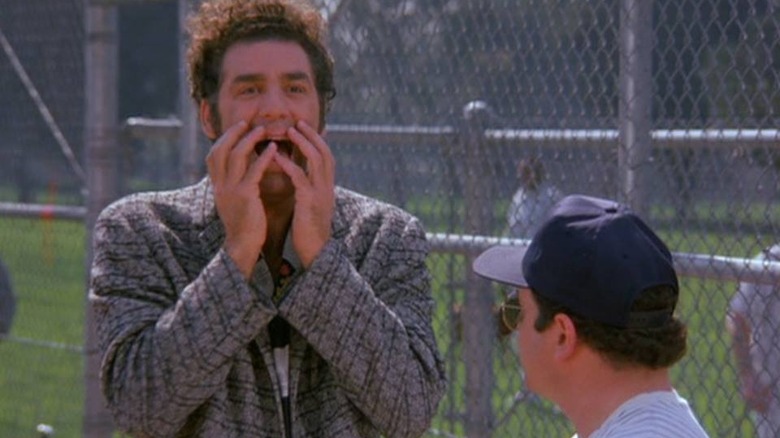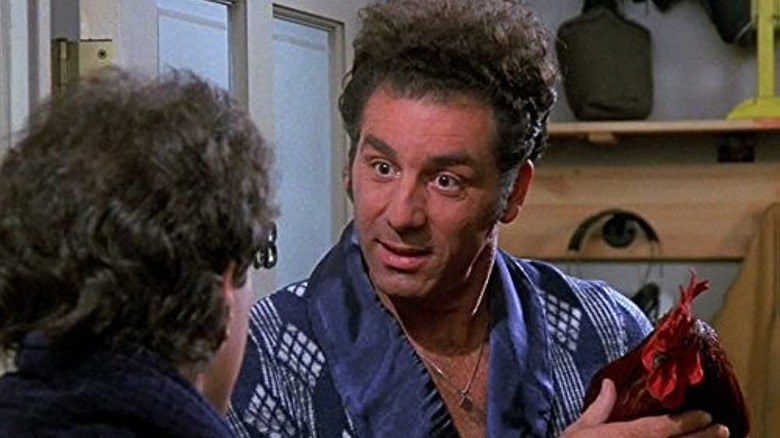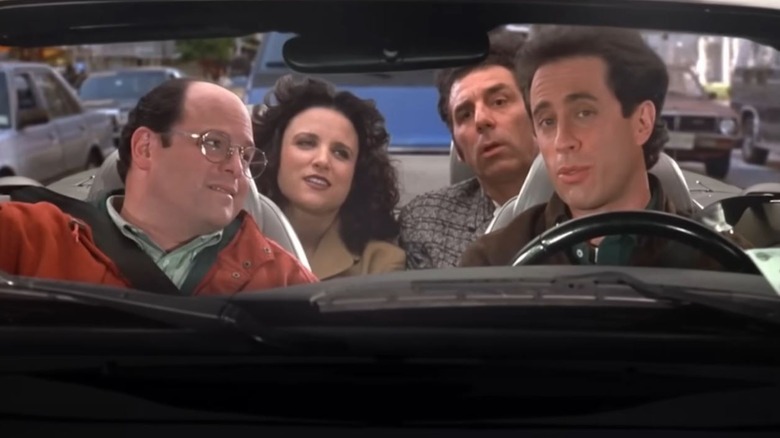Kramer's 12 Worst Episodes Of Seinfeld Ranked
One of the most celebrated sitcoms of all time is "Seinfeld," created by Larry David and Jerry Seinfeld, chronicling a fictionalized version of Jerry's life and career as a stand-up comedian in New York City. Among Jerry's close group of friends throughout the series is Cosmo Kramer (Michael Richards), Jerry's next door neighbor who frequently barges into Jerry's apartment with eccentric schemes. Even though Richards' performance is one of the series' greatest comedic strengths, earning him three Emmy Awards, not every episode he appeared in is a hilarious triumph.
From a gross underutilization of the character to narrative decisions that are a step too questionable, even for someone as outlandish as Cosmo, here are the 12 worst "Seinfeld" episodes for Kramer. Richards may have a strong handle on his popular character but, with nine seasons, the material he was given wasn't always reliably strong and here are the episodes when it came up short.
12. The Strongbox (Season 9, Episode 14)
In response to a string of burglaries in the apartment complex, Kramer decides to protect his valuables in the Season 9 episode "The Strongbox," acquiring the eponymous object. While this is one of Kramer's more sensible decisions in the entire series, the lengths that Kramer goes to hide the strongbox's key are decidedly more nonsensical. However, the biggest flaw in "The Strongbox" is that Kramer's arc in the episode isn't particularly funny, serving a narrative function throughout the story rather than a comedic one.
There are definitely funny moments throughout "The Strongbox" but Kramer isn't central to any of them, existing more on the periphery to drive Jerry's story forward. From planting his strongbox key in inconvenient places around the complex to agreeing to help Jerry raid a pet cemetery, Kramer doesn't really get much to work with on his own in the episode. There are plenty of "Seinfeld" episodes that underutilize Kramer, but "The Strongbox" makes this flaw more glaringly evident given his role in Jerry's plot line and the episode being named after Kramer's acquisition. A missed opportunity of an episode, "The Strongbox" noticeably gives its breakout character the comedic short shrift and is all the poorer for it.
11. The Van Buren Boys (Season 8, Episode 14)
With his eccentric lifestyle, unique worldview, and so much of his past an open mystery, Kramer is bound to have an unbelievably interesting life which is explored in the Season 8 episode "The Van Buren Boys." When Elaine Benes (Julia Louis-Dreyfus) is assigned to ghostwrite the memoirs of her boss J. Peterman (John O'Hurley), she decides to use Kramer's life stories for material. To her obvious dismay, the autobiographical stories that Kramer provides her with turn out to be largely dull and mundane, forcing her to fabricate the memoirs instead.
When Elaine finally recounts a thrilling story from Kramer's past under the guise of it being part of Peterman's memoirs, Kramer decides he wants his own life stories back. Peterman eventually acquiesces but the move of having someone else not only write his autobiography, but use other people's stories for it is an oddly unscrupulous move for him. Also, the idea of Kramer's memoirs being unremarkably boring in contrast to the enigmatic nature of the character is a bit of a disappointment. Just a strangely off-color episode all around, "The Van Buren Boys" is a prime example that "Seinfeld" may have begun to narratively spin its wheels by its penultimate season.
10. The Betrayal (Season 9, Episode 8)
The entire storytelling gimmick behind the Season 9 episode "The Betrayal" is that the scenes are presented in reverse chronological order revolving around a disastrous wedding ceremony in India. Though Kramer doesn't accompany Jerry, George, and Elaine for the nuptials, he has his own set of antics in New York recounted in reverse over the course of the episode. In an episode that never quite seems to rise above its odd narrative structure, Kramer's subplot stands as a peculiar addition that starts with a forced shock and contrived path to reach it.
While Jerry and his friends are preoccupied with drama behind the impending wedding, Kramer is unsettled when his friend Franklin Delano Romanowski (Mike McShane) uses his birthday wish to wish Kramer dead. Kramer goes through absurd lengths to counter this malicious birthday wish, going as far as to fake his own death, with the sight of his tombstone launching his storyline in the episode. Though Kramer has always been one to take things too seriously, his plot line in "The Betrayal" never lives up to the shock of beginning with his fake death. An uneven episode that never justifies its unusual storytelling structure, "The Betrayal" is more focused on its narrative technique than the actual story itself.
9. The Chaperone (Season 6, Episode 1)
Jerry certainly enjoys the bachelor lifestyle over the course of the series, dating many beautiful women across the show's run, rarely with any sense of serious commitment. In the Season 6 premiere, "The Chaperone," Jerry lands a date with Miss Rhode Island, Karen (Marguerite MacIntyre), after a chance meeting, but the couple must be accompanied by a chaperone as per Miss America pageant rules. Against his better judgment, Jerry selects Kramer to fill the chaperone role for their date, resulting in an awkward night out on the town as he monitors the couple.
Over the course of Jerry and Karen's date, Kramer incessantly questions the beauty queen and makes disparaging remarks about her chances to win, including her physical appearance. Even more absurdly, Karen appreciates the criticism and decides to hire Kramer as her personal coach to help her win the pageant. Kramer becoming a chaperone shows how quickly and wholeheartedly he will take on any duty levied his way, a distinction that carries over to becoming Karen's pageant coach. However, Kramer commenting so frankly on a woman's worth and appearance, particularly one as vulnerable as Karen, makes for an uncomfortable dynamic that doesn't quite connect comedically as much as it should.
8. The Trip, Part 1 (Season 4, Episode 1)
Picking up from the cliffhanger Season 3 finale, the two-part Season 4 premiere opens with Kramer relocating to California to pursue a career in acting, with Jerry unsuccessful in reconciling with him. The first episode in the two-parter story, "The Trip," has Jerry and George (Jason Alexander) travel to Los Angeles to reconnect with their missing old friend. Meanwhile, Kramer is suspected by the police of being a Southern California serial killer while he finds little traction in landing acting jobs after attending multiple casting calls.
The big problem with "The Trip" is that it fundamentally fails to recognize that Kramer works best as a supporting character rather than serving as the main focus of an episode. Kramer is seen attending a variety of auditions throughout the season premiere, but his eccentric nature hinders his chances of being cast in any acting roles. In short order, these audition sequences become contrived, with the humor becoming repetitive and forced as Kramer bungles his way through finding work in Hollywood. Shifting the series temporarily from New York to Los Angeles gave it an opportunity to change things up but it fails to take advantage of the change in setting and Kramer's status quo.
7. The Trip, Part 2 (Season 4, Episode 2)
Despite sharing a title with the Season 4 premiere, "The Trip Part 2" actually aired separately the following week during the initial broadcast run as a direct continuation, a rarity for a series ostensibly about nothing. Alerted that Kramer has been mistaken for a serial killer active in Los Angeles, Jerry and George now actively search the City of Angels for their missing friend though the police locate Kramer first. While the tired antics of Kramer trying to land an acting job in the season premiere are discarded here, the episode continues to portray the character in an awkwardly unfunny light.
Kramer's big scene in "The Trip, Part 2" has him in police custody facing interrogation for the grisly murders and completely cracking under the pressure despite not being the actual killer. In an uncomfortable moment played for laughs, Kramer experiences a nervous breakdown while being interrogated and begins sobbing uncontrollably in the face of police questioning. Even more puzzling, there is no rationale given for Kramer returning to New York after being exonerated for the murders, robbing the audience of any meaningful reconciliation between him and Jerry. An odd way to start Season 4, the two-part storyline is a detour from the usual New York hijinks that overstays its welcome.
6. The Keys (Season 3, Episode 23)
Ever since his first appearance, Kramer has always barged into Jerry's apartment uninvited to declare his latest scheme or raid Jerry's pantry and fridge for food and drink. This finally reaches a breaking point in the Season 3 finale "The Keys" as Jerry finds Kramer's unwelcome intrusions have inconvenienced him far too often. This culminates in the two friends having their biggest argument in the entire series, with Jerry reclaiming his spare apartment keys that he loaned to Kramer, depriving him of any future unannounced entries into Jerry's home.
As one can imagine, Kramer takes this falling out with Jerry and the loss of the keys hard, but in ways that are uncomfortably childish even for him. Kramer gets introspective after his argument with Jerry, undergoing a full existential crisis that has him reevaluate his life and career in New York City. Jerry grows understandably concerned with Kramer's behavior and this discomfort carries over to the audience too, worsened when Kramer refuses to accept the keys back when Jerry attempts to make amends. Kramer is a character that, while eccentric, can easily come across as disturbed and "The Keys" flirts with the wrong side of this character potential.
5. The Andrea Doria (Season 8, Episode 10)
The Season 8 episode "The Andrea Doria" reveals Kramer is deeply distrustful of doctors, refusing to see one after he develops a bad cough and opting to visit a veterinarian for their medical expertise instead. After following through on the vet's medical advice, Kramer begins to display canine-like personality traits leading to a series of strange encounters and scenes as he grows more animalistic. This behavioral transformation into a dog culminates in Kramer biting Newman (Wayne Knight) on the ankle, fueled by the generalized animosity between dogs and mail carriers.
Kramer's canine personality is a contrived premise for his character arc in the episode, with the already-unfunny joke worsened by its prolonged presence. Though Richards' has demonstrated a strong penchant for physical comedy across his celebrated performance as Kramer, turning the character into a human dog is a step too far. Kramer is a peculiar character, to be sure, but the idea of him transforming into a dog is the kind of forced one-note joke that was best discarded in the writers' room. "The Andrea Doria" takes an already absurd character in Kramer and makes him unfunnily bizarre and oddly feral in one of the series' weaker episodes.
4. The Seinfeld Chronicles (Season 1, Episode 1)
The first season of "Seinfeld" is a strange time capsule of a show that still hasn't discovered its own identity, let alone the names and personalities of its major characters. The character in the series that perhaps changed the most since their debut is Kramer who, while still being Jerry's neighbor, is considerably less eccentric and is named Kessler. A far cry from the lovably odd character that has endeared himself to millions of fans, Kessler makes his introduction in the series premiere episode "The Seinfeld Chronicles."
Visiting Jerry's apartment after a late night comedy set, Kessler/Kramer spoils a baseball game that Jerry taped in the interim before raiding Jerry's fridge to fix himself a sandwich. In addition to the change of name, several inconsistencies are apparent from Kramer's original appearance, including Jerry claiming that he hasn't left their apartment building in years. It is clear that the writers don't quite know what to do with Michael Richards just yet and take full advantage of his comedic talent, though some of the foundational elements to the character are still present. The Season 9 episode "The Betrayal" would make light of this contradictory appearance, with Kramer pointing out the buzzer on his apartment is incorrectly labeled, leading to the confusion.
3. The Understudy (Season 6, Episode 24)
The sixth season of "Seinfeld" ended with one of the biggest celebrity guest stars the series ever had, with Bette Midler appearing as a fictionalized version of herself. In the Season 6 finale, "The Understudy," Kramer steps in to personally care for Midler at the hospital after she is accidentally injured by George during a charity softball game. Kramer quickly reveals himself to be obsessed with Midler, attending to her every need and refusing to let anyone else enter her hospital room as he maintains a constant vigil.
Kramer's fixation with Midler, though well-intentioned, quickly makes his friends uncomfortable with how possessive he becomes of her, a discomfort that spreads to the audience. This culminates with Kramer kidnapping Midler and taking the actor back to his apartment and fleeing from the hospital with her in one of his most morally questionable moments. Kramer has always been a character to get unhealthily fixated on a flight of fancy before moving on to something else but, to get obsessed with a living person drains the comedy out of the trope. Fortunately, Midler's appearance on "Seinfeld" is a one-off role, sparing the audience of Kramer possessively pursuing her – or any other celebrity guest star.
2. The Little Jerry (Season 8, Episode 11)
In the Season 8 episode "The Little Jerry," Kramer adopts what he presumes is a hen so he can provide himself with farm-fresh eggs every morning only to learn he accidentally adopted a rooster instead. Naming his newly acquired bird Little Jerry, Kramer is enticed by a local bodega owner named Marcelino (Miguel Sandoval) to enter the rooster into underground chicken fights around New York City. However, as Little Jerry begins to experience success in these animal fighting rings, Kramer and the human Jerry witness the even shadier side of this illegal practice.
Though Kramer becoming involved in animal fighting isn't necessarily his first choice for his rooster, his willingness to participate in the inhumane practice is perhaps a moral low for the character. To make matters worse, Kramer and Marcelino learn about Little Jerry's aptitude for fighting after the rooster violently fends off a small dog. By the end of the episode, Kramer develops enough of a conscience to personally interrupt a planned fight to save Little Jerry but this comes too late. "The Little Jerry" is driven by systematic animal cruelty played for comedy and is just one moral bridge too far for even "Seinfeld" to cross.
1. The Puerto Rican Day (Season 9, Episode 20)
One of the more controversial "Seinfeld" episodes was also one of its last: the late Season 9 episode "The Puerto Rican Day," the last scripted episode before the series finale. As the gang returns to Manhattan from a New York Mets game, they find themselves caught in the middle of a parade downtown celebrating Puerto Rican culture. The group splits up as they navigate their way back home, with Kramer justifiably incurring the wrath of the parade over a fiery misunderstanding involving a Puerto Rican flag.
As Kramer maneuvers through the parade, he accidentally sets a Puerto Rican flag on fire and stomps on it in an effort to put out the flame. Underscoring the cultural insensitivity, Kramer observes the packed streets and claims that everyday is like this in Puerto Rico before the parade turns on him. The public blowback from the episode and Kramer's actions were so severe that the network issued a formal apology in response to a flood of angry letters and protests. A disappointing way for the series to head into its finale, "The Puerto Rican Day" gave Kramer his worst on-screen moment with an extended gag that was dead-on-arrival.
